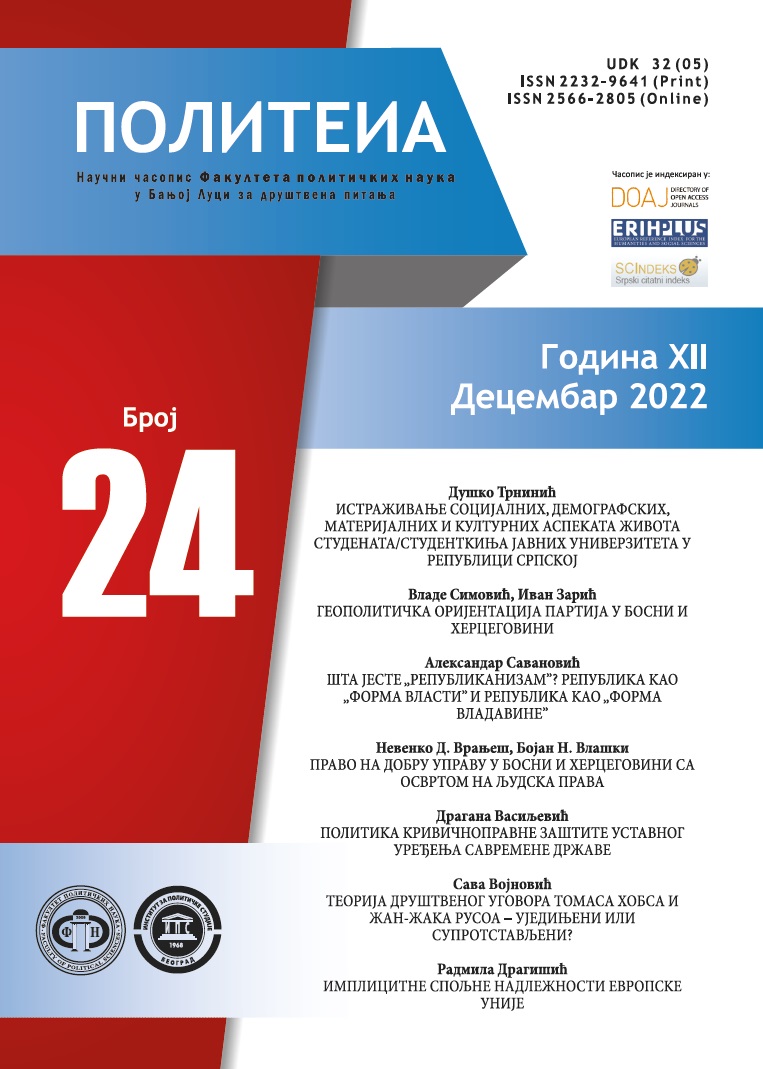SOCIAL CONTRACT THEORY OF THOMAS HOBBES AND JEAN-JACQUES ROUSSEAU – UNITED OR OPPOSED?
Abstract
Thomas Hobbes and Jean-Jacques Rousseau are among the most important modern political philosophers, who base their theories on the idea of social contract. Both authors start from the natural equality of all people and the uncertainty of the natural state, but at first glance they end up with completely different perspectives on sovereignty and relations within a political society. Rousseau insists on the common sovereignty of all citizens, who have a guaranteed economic minimum and the inalienable authority to enact laws and care for the general will, by which they all together simultaneously constitute those who are governed. Hobbes, on the other hand, dictates that the people elect a sovereign who is always in their natural state and must have great power in order to fulfil their role as protector. Yet, the paper argues that their positions are not really that different, bearing in mind Rousseau's executive power and wise legislators, and Hobbes' strong rights of subjects. The thesis of the paper is that in both of them the people authorize and supervise, and someone else rules.
References
Arendt, H. (1965). On Revolution. London: Penguin Books.
Bertram, C. (2004). Rousseau and The Social Contract. London and New York: Routledge.
Cohen, J. (2010). Rousseau: A Free Community of Equals. Oxford and New York: Oxford University Press.
Dent, N. (2008). Rousseau. London and New York: Routledge.
Herbert, G. (1989). Thomas Hobbes: The Unity of Scientific and Moral Wisdome. Vancouver: University of British Colombia Press.
Hobbes, T. (1969). Philosophical Rudiments Concerning Govermnement and Society, in The English Works of Thomas Hobbes of Malmesbury: Vol. II (ed. by Sir William Molesworth). London: John Bohn.
Hobz, T. (1961). Levijatan. Beograd: Kultura.
Inston, K. (2010). Rousseau and Radical Democracy. New York: Continuum International Publishing Group.
Kain P. J. (1990). Rousseau, the General Will, and Individual Liberty. History of Philosophy Quarterly, Vol. 7, No. 3: 315‒334.
Kriele, M. (1988). Einführung in die Staatslehre. Die geschichtlichen Legitimitätsgrundlagen des demokratischen Verfassungsstaates. Rowohlt: Reinbek bei Hamburg.
Molnar, A. (2001). Rasprava o demokratskoj ustavnoj državi – 2. Klasične revolucije: Nizozemska‒Engleska‒SAD. Beograd: Semizdat B92.
Molnar, A. (2002). Rasprava o demokratskoj ustavnoj državi – 3. Moderne revolucije: Francuska‒Rusija‒Nemačka. Beograd: Semizdat B92.
Nonnenmacher, G. (1989). Die Ordnung der Gesellschaft. Mangel und Herrschaft in der politischen Philosophie der Neuzeit: Hobbes, Locke, Adam Smith, Rousseau. Weinheim: VCH Acta Humaniora.
Putterman, E. (2010). Rousseau, Law and the Sovereignty of the People. Cambridge: Cambridge University Press.
Ruso, Ž. Ž. (1949a). Društveni ugovor. Prosveta: Beograd.
Ruso, Ž. Ž. (1949b). O poreklu i osnovama nejednakosti među ljudima, u Društveni ugovor. Prosveta: Beograd.
Rousseau, J. J. (2000). The Confessions. Feedbooks.
Schmitt, C. (2007). The Concept of the Political. Chicago and London: The University of Chicago Press.
Shklar, J. (1969). Men and Citizens: A Study of Rousseau’s Social Theory. Cambridge: Cambridge University Press.
Simpson, M. (2006). Rousseau’s Theory of Freedom. London: Continuum.
Skinner, Q. (1998). Liberty Before Liberlism. Cambridge: Cambridge University Press.
Slomp, G. (2009). Carl Schmitt and the Politics of Hostility, Violence and Terror. New York: Palgrave Macmillan.
Sreedhar, S. (2010). Hobbes on Resistance: Defying the Leviathan. Cambridge: Cambridge University Press.
Steinberger, P. J. (2008). Hobbes, Rousseau and the Modern Conception of the State. The Journal of Politics, Vol. 70, No. 3: 595‒611.
Autori koji objavljuju u ovom časopisu pristaju na sljedeće uslove:
- Autori zadržavaju autorska prava i pružaju časopisu pravo prvog objavljivanja rada i licenciraju ga "Creative Commons Attribution licencom" koja omogućava drugima da dijele rad, uz uslov navođenja autorstva i izvornog objavljivanja u ovom časopisu.
- Autori mogu izraditi zasebne, ugovorne aranžmane za neekskluzivnu distribuciju članka objavljenog u časopisu (npr. postavljanje u institucionalni repozitorijum ili objavljivanje u knjizi), uz navođenje da je članak izvorno objavljen u ovom časopisu.
- Autorima je dozvoljeno i podstiču se da postave objavljeni članak onlajn (npr. u institucionalni repozitorijum ili na svoju internet stranicu) prije ili tokom postupka prijave rukopisa, s obzirom da takav postupak može voditi produktivnoj razmjeni ideja i ranijoj i većoj citiranosti objavljenog članka (Vidi Efekti otvorenog pristupa).

